Jerusalem Christians say attacks on the rise
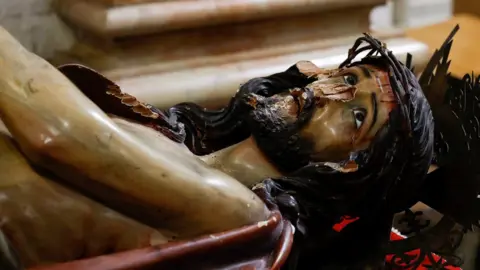 Reuters
ReutersWalking in the footsteps of Jesus, huge crowds of Christian pilgrims have this month thronged Jerusalem's ancient streets where the Easter story unfolded.
"It's very emotional, I already cried a little," says Marina, who is visiting from Belgrade and joined the Orthodox Good Friday procession carrying a wooden cross. "It's something you have to feel to be here."
Local Christians also stand out as they join the devotions, with Palestinian and Armenian scout groups leading religious processions.
But in recent months, Christians living in the occupied East of the city say they have seen increased harassment and violence.
Wave of attacks
The Greek Orthodox Patriarch Theophilos III has warned of "unprecedented attacks on the Christian presence by radical Israeli groups".
At the start of the year, on Mount Zion, where Christians believe the Last Supper took place, two ultra-Orthodox teenagers were caught on security cameras desecrating graves in the Anglican cemetery.
Crosses and headstones were smashed. Israeli police later said two arrests had been made.
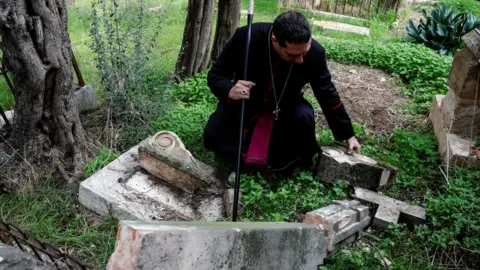 Reuters
ReutersAt the end of January, an extremist Jewish mob hurled chairs and damaged property in violent scenes at an Armenian-owned restaurant by New Gate in the Old City. There were cries of "Death to Arabs, Death to Christians".
The next month, a religious Jewish American tourist vandalised a statue of Christ with a hammer at the Church of the Flagellation on the Way of the Cross.
In a video shot at the scene, a Palestinian guard could be heard shouting "call the police" while the man he has wrestled to the floor calls out: "you're not allowed to have idols." He was said to be undergoing a psychiatric evaluation.
Over the years, cases of spitting, cursing and pushing priests in the Old City have become routine. However, church leaders say recently there has been more sectarian abuse.
"It's happening because there is hatred and fanaticism, radicalisation of a part of the Israeli society," says Bishop William Shomali of the Latin Patriarchate. "It's a minority of people."
He suggests the rise of the far right in Israeli politics has played a role. The current Israeli government includes ultranationalists, such as finance minister Bezalel Smotrich, who advocate policies showing intolerance for those who do not share their religion.
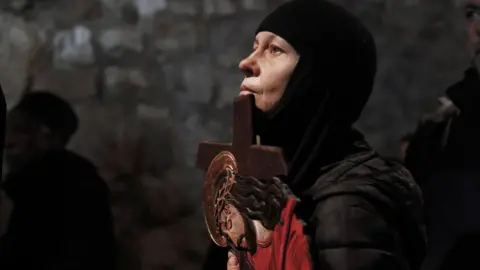 EPA
EPA"I don't believe that it is a strategy of the new government to attack churches," Bishop William says. "But the young people who practise these offences feel in some way protected because they have strong representatives in the government."
The holy city of Jerusalem lies at the heart of the Christian faith. However, the number of Christians living here has dropped from a quarter of the population a century ago to under 2%. Many have emigrated, escaping the painful daily realities of the Israeli-Palestinian conflict and seeking better opportunities elsewhere.
Because of the small size of their community, Christians complain they are disproportionately affected by Israeli policies which make it difficult for Palestinians from Jerusalem to marry those from the occupied West Bank and stay with their families in the city.
'Not isolated acts'
Jewish settlers are also taking over more and more properties. Settlements are seen as illegal under international law, but Israel disagrees.
Many Christians feel that the growing hostility towards them is meant to push them out.
In the Old City's Armenian Quarter, Setrag Balian sees an increase in racist abuse, hate-filled graffiti and intimidation, and blames Jewish religious nationalists.
"They're here to provoke, annoy and insult anyone who is not Jewish. These are people who feel entitled and who feel that all of the Old City, all of Jerusalem, all of the Holy Land belongs to them," he says.
He shows me a video of how he and his friends confronted a masked Jewish Israeli trying to scale the wall to take down the Armenian patriarchate flag, which bears a cross. The incident later resulted, he says, in his friends being pepper sprayed, called terrorists, and getting in trouble with the police. The police say they responded to reports of a fight and that officers were pushed.
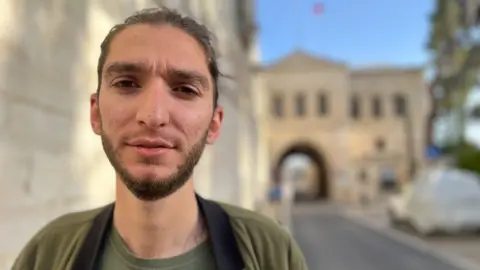
Setrag wants more international attention for sectarian problems.
"Either the Christian world decides to wake up and defend their Christian brothers who are here defending the lands where Jesus walked, which is the birthplace of Christianity, or we will lose it all," he says.
Israeli police are often accused of a slow response, but in a statement they told the BBC they "take acts of bullying, violence, and vandalism of any kind with severity. All incidents were dealt with quickly and decisively."
"Israel Police forces are working diligently to maintain security, order, and freedom of worship for members of all religions and denominations," they added.
Along the narrow alleyways of the Old City, near Zion's Gate, the Jerusalem Intercultural Center (JICC) is a non-profit organisation trying to change attitudes and behaviour. For almost a decade it has tracked attacks on Christian clergy, property, pilgrims and locals.
"In the last three months, we've picked up dozens of attacks and the goal now is to use the data to show policymakers that these are not individual or isolated acts," says Daniel Hasson, director of the JICC.
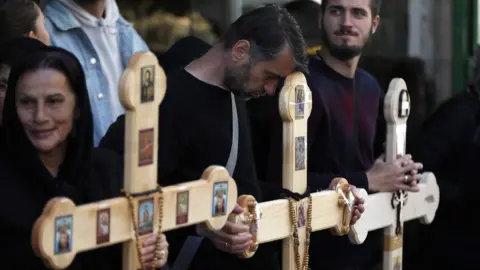 EPA
EPAThe centre encourages witnesses and victims of sectarian abuse to come forward, arranges for volunteers to accompany Christian processions and works with leaders of different faiths in the Old City.
"What we're missing right now is having our political leaders also speaking out against acts of violence," Mr Hasson says.
"The stakes here are very, very high. The Old City is important to all the monotheistic religions, which is more than half of humanity, so we have an obligation to look after its special character for the sake of all."
Back at the Orthodox Good Friday procession, a clutch of locals arrives at the Holy Sepulchre Church - built on the spot where it is believed Jesus was crucified, buried, and resurrected.
This Easter, with many worried about their future, Christians in Jerusalem say they are clinging on to the holiday's message of hope.
